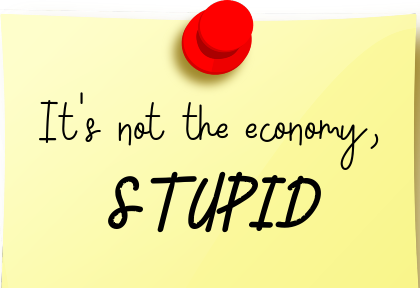
In the run-up to 1992’s presidential election, chief strategist James Carville relentlessly hammered on a simple message for Bill Clinton’s Democratic campaign: “It’s the economy, stupid.”
Social issues and foreign policy, Carville theorized, were mere distractions. Voters would prioritize their pocketbook prospects over such things when choosing between Clinton and incumbent president George H.W. Bush, so Clinton should focus on those prospects.
It worked, and operatives from both “major” parties took the lesson to heart.
More than three decades later, Donald Trump and his proxies are hitting hard with talk about how great the economy was four years ago and how terrible it is now.
Meanwhile, Joe Biden and his proxies are advertising various economic indicators as evidence that his policies have “worked” to revive an economy terribly damaged by the COVID-19 pandemic (while not so casually mentioning that the damage started on Donald Trump’s watch, while the recovery began on Biden’s).
Back in 1992, talk radio host Rush Limbaugh questioned the Clinton strategy on a near-daily basis.
He pointed to polls showing that most Americans thought the overall economy was terrible, while also describing their personal economic situations as pretty good.
Well, guess what:
According to a late January poll by the Associated Press and NORC Center for Public Affairs, only 35% of American adults rate the national economy as “good,” while 65% call it “poor.”
But according to the Harris Poll /Axios “Vibes Survey,” 63% of Americans say their own financial situations are “good” or “very good.”
As in 1992, the 2024 incumbent lags his challenger and, where the economy is concerned, does so on a similar set of poll responses.
I’m not interested in convincing you that “Bidenomics” has “worked” (it hasn’t).
Nor am I interested in convincing you that Trump’s first term was some kind of economic golden age (it wasn’t).
In fact, both presidents have done terrible damage to the general economy and to your personal well-being, pledged to continue doing such damage if returned to office, and worked hard to expand presidential power to do such damage. Their policies made the economic impact of the pandemic far worse, and the recovery much slower and weaker, than it should have been — and WOULD have been if they’d stepped out of your way instead of locking you down and throwing “stimulus” checks at you.
If you’re seeking a reason to support either of them, look elsewhere — it’s not the economy, stupid.
Thomas L. Knapp (Twitter: @thomaslknapp) is director and senior news analyst at the William Lloyd Garrison Center for Libertarian Advocacy Journalism (thegarrisoncenter.org). He lives and works in north central Florida.
PUBLICATION/CITATION HISTORY


